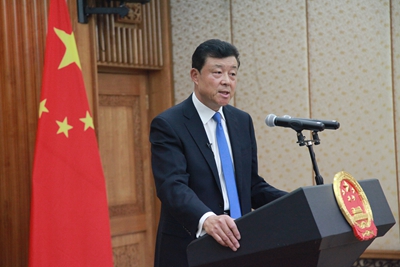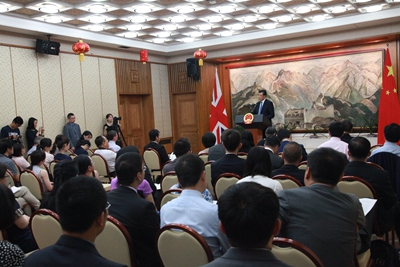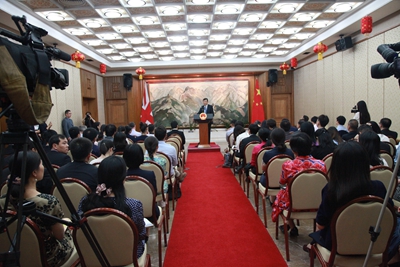|
On 19th July 2016, H.E. Ambassador Liu Xiaoming held a press conference at the Chinese Embassy on the so-called ruling of the arbitral tribunal in the South China Sea arbitration. About 40 journalists from state media of China including People's Daily, Xinhua News Agency, CCTV, China News Service, China Radio International, China.com.cn, China Daily, Economic Daily, Science and Technology Daily, and Financial Times, Daily Telegraph, Politics First, Propeller TV of the UK, as well as Associated Press, Phoenix Infonews, Phoenix Business, Ta Kung Pao, European Times, The Chinese Weekly, The UK Chinese Journal, UK Chinese Times, Sing Tao Daily attended the press conference.

Ambassador Liu expounded on China's solemn position on the so-called ruling of the arbitral tribunal in the South China Sea arbitration, introduced the Chinese government statement, the Chinese Foreign Ministry statement and the white paper of China's State Council Information Office, and answered questions from the journalists.
The following is the opening remarks of Ambassador Liu at the press conference.
Ladies and Gentlemen:
Good morning. Welcome to the Chinese Embassy.Today's press conference will focus on one subject. That is China's position on the South China Sea arbitration ruling.
On 12 July, the so-called tribunal for the South China Sea arbitration unilaterally initiated by the Philippines announced its award. The Chinese government immediately reaffirmed its solemn position that China does not accept or recognize the award.
Chinese President Xi Jinping stressed the following points:
The relevant islands and reefs in the South China Sea have been China's territory since ancient times.
China's territorial sovereignty and maritime rights and interests will in no circumstances be affected by the ruling of the Philippines' initiated arbitration.
China will not accept any proposition or action based on the ruling.
China remains firmly committed to safeguarding peace and stability of the South China Sea.
China remains committed to settling the disputes with countries directly involved through peaceful negotiations based on the recognition of historical facts and in accordance with international law.
To further elaborate on China's position, the Chinese government issued two statements and a white paper and interpretations of these documents by senior officials have also been released.
The Chinese Government issued the Statement on China's Territorial Sovereignty and Maritime Rights and Interests in the South China Sea.
The Chinese Foreign Ministry issued the Statement on the Award of 12 July 2016 of the Arbitral Tribunal in the South China Sea Arbitration Established at the Request of the Republic of the Philippines.
China's State Council Information Office published a white paper entitled "China Adheres to the Position of Settling Through Negotiation the Relevant Disputes Between China and the Philippines in the South China Sea".
The Statements and Whitepaper provide authoritative, comprehensive and clear-cut elaborations on China's position.
In-depth readings of these documents have been provided by State Councilor Yang Jiechi in an interview, by Foreign Minister Wang Yi in his remarks and by Vice Foreign Minister Liu Zhengmin in a press briefing on the Whitepaper.

Here, I would like to talk very briefly about these documents.
The Statement by the Chinese Government reaffirms China's territorial sovereignty and maritime rights and interests in the South China Sea.
The Statement underscores the facts that China is the first to have discovered, named, and explored and exploited Nanhai Zhudao, or South China Sea islands, and relevant waters. China is the first to have exercised sovereignty and jurisdiction over them continuously, peacefully and effectively.
The Statement explicitly points out that China's territorial sovereignty and maritime rights and interests in the South China Sea include its sovereignty over Nanhai Zhudao.
China has internal waters, territorial sea, contiguous zone, exclusive economic zone and continental shelf, based on Nanhai Zhudao.
China has historic rights in the South China Sea.
The statement also emphasizes that China is always firmly opposed to the invasion and illegal occupation by certain states of some islands and reefs of China's Nansha Qundao, or Nansha Islands, and firmly opposed to activities infringing upon China's rights and interests in relevant maritime areas under China's jurisdiction.
At the same time, China stands ready to continue to resolve the relevant disputes peacefully through negotiation and consultation with the states directly concerned. China is ready to to work with them to jointly maintain peace and stability in the South China Sea and to ensure the safety of and the unimpeded access to the international shipping lanes in the South China Sea.
The Statement by the Chinese Foreign Ministry focuses on the arbitration.
It points out that the subject-matter raised by the Philippines for arbitration are beyond the jurisdiction of UNCLOS.
The arbitration infringes on China's right as an UNCLOS state party, namely the right to choose the procedures and means for dispute settlement on its own will.
The arbitration also violates a series of bilateral agreements between China and Philippines and the commitment made by China and ASEAN member countries to resolve relevant disputes through negotiations.
The tribunal has in essence expanded its power, exceeded its authority and abused arbitration proceedings. Its ruling is therefore null and void and has no binding force.
China will neither accept nor recognize it.
The White Paper offers an overall elaboration on how China's sovereignty over Nanhai Zhudao was established in the course of history, and what China has been doing to uphold its territorial sovereignty and maritime rights and interests.
The White Paper shed light on the origin and development of the disputes between China and the Philippines.
It aims to get to the root of the issue and set the record straight.
At the same time, the White Paper reiterates China unchanged commitment to negotiation and consultation as the right way to settle disputes.
China believes only a negotiated result can gain understanding and support from people of countries concerned.
Only a negotiated result can be effectively implemented.
And only a negotiated result can be enduring.
As State Councilor Yang Jiechi said in his interview, as long as China and the Philippines stay committed to the principles and spirit of the DOC, stay committed to dialogue and consultation to manage differences properly, and stay committed to friendly and win-win cooperation, Sino-Philippine relations will have a bright future.
I have asked for copies of these documents and transcripts of the interview and remarks prepared for your reference, in both Chinese and English, to help you get a in-depth and comprehensive understanding of China's position. Please feel free to take the copies with you after the conference.
Now I would like to take your questions.

|

